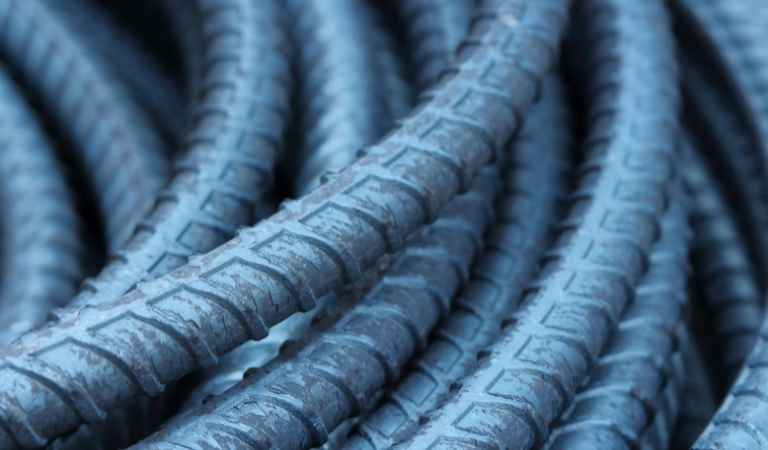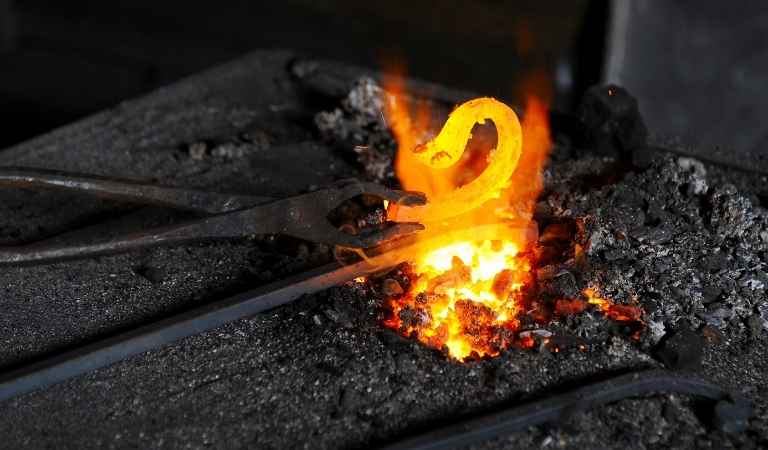Rebar, or reinforcement bar, is a type of steel that can be used to reinforce concrete structures & site concrete. It has been discovered by some blacksmiths that rebar can also be used for forging metal.
This blog post will talk about the benefits and detriments of using rebar and how you can effectively use it in your blacksmithing work!
Is Rebar Good for Forging?
Rebar is excellent for people starting to forge metal. Because the material is cheap and easy to find, it is a great substitute for other materials such as wrought iron, which are more expensive and can be difficult to find.

The most important thing with rebar however is that you need to use the right kind of metalworking tongs or else your work will all go up in smoke!
However, professional blacksmiths are not fond of working with rebar because it can be difficult to work with- you have to use twice as much force while hammering or molding! But if you’re looking for a good way to amp up your projects and intuitively understand metallurgy at the same time, this can be a game-changer.
Can you forge with rebar?
As we have already answered, you can definitely forge with a piece of rebar! It is a great material to start out with and it’s cheap, so you don’t have anything at risk. Plus as long as you use the right type of tongs and apply the right amount of force, your work will come out good, if not perfect!
Is rebar good for making knives?
No, I don’t recommend using rebar for making knives. The material is too brittle and the force of hammer that goes into forging it won’t make a very sharp steel blade.
Rebar can be used to help forge other pieces of metal, but I would not use this type of bar at all if you’re looking to make blades or any sort of knife. The main issue here is the material used for making the rebar. You never know what has been used for making the rebar you have. So, you don’t really know how much heat or force to use to make a perfect knife. Plus, you can’t be sure about the durability of it as well.
Benefits of Using Rebar in Blacksmithing
Here are some of the benefits of using rebar for blacksmithing which may convince you to try this material instead of discarding its chances altogether-
Rebar is cheap and easy to find
Rebar is available all over the world and is generally cheaper than other materials used in blacksmithing. With rebar, it’s much less likely for beginners to experience frustration or disappointment with their piece because the material is not going to cost much.
Great for Practicing before the Final Project
Rebar is a great material for practicing before forging the final piece. It’s much more forgiving as it doesn’t need to have cared much in order to work, and can easily bend or break without risking being ruined entirely like other metals would have been.
Easier on Beginners’ Tools
Finally, rebar is perfect for beginners because it won’t damage or break their tools. This is helpful for those who are just starting out and don’t have a lot of experience yet with metalwork, as they can still complete the project without having to worry about expensive equipment that may not be up to par just yet.

Downsides of Using Rebar in Blacksmithing
Here are some of the cons of using rebar in blacksmithing projects-
Not Made for Blacksmithing
Rebar is not made for using in a forge. So, it takes twice the amount of force to work with rebar as it does wrought iron or steel, so it might not always come out perfect when using this type of material. Plus, you do need a specific type of tongs to work with rebar that can be difficult for new blacksmiths to find.
Inconsistency in Behavior
Rebar is sometimes brittle and sometimes flexible, making it not suitable at all if you’re looking to make knives or any other type of blade. The material isn’t strong enough, so it will often break or bend without a lot of force being applied.
Uncertain Build Quality
You never know what type of materials have been used to make the rebar that you have, so it’s tough to work with this material and try out new projects. You’ll find it difficult to achieve the perfect heat inside the forge in order to shape the rebar into something useful.
Hard to Get Quality Finish
The finish on rebar is never going to be as good as steel or wrought iron because of the material that it’s made from. The end result will often have a rough texture and look, which may not work for you if your goal is to create something with an attractive finish.
Difficulties in Finding Materials Needed
In some cases, there might not be the right type of material available in order to forge with rebar. It’s tough for beginners and experienced blacksmiths alike, because it takes a lot more effort or knowledge before being able to make use of this material properly. The lack of availability also makes working with rebar difficult if you’re trying to find something specific that might not be available.
Final Verdict: The Cons Outweigh the Pros of Rebars in Blacksmithing
There are a lot more cons to working with rebar, however, it is still possible to work with this material if you’re okay with these downsides and do not need something specific that’s going to take too much time or effort before creating your final project. But it’s the cons that prevent experienced blacksmiths from using rebar in their projects.
How hot should rebar be forged?
Rebar can withstand high temperatures and is often used in construction because it’s strong enough to hold cement together without bending or breaking when the concrete dries.
If you’re forging rebar, then your fire needs to get really hot so that you can heat the steel to a point where it can be molded into any shape.
The rebar needs to reach at least 2000 degrees Fahrenheit for forging, but if you’re just heating up the rebar then it doesn’t need to get anywhere near that hot – usually, around 800-1000 degrees will do the trick.
Why use Rebar in your Blacksmithing Projects?
Rebar is a suitable option for beginner blacksmithing projects because it lasts a decent amount of time and is resistant to corrosion when forged with solid technique. It’s also easy to acquire, as it can be found in most major hardware stores or home improvement shops at an affordable price! However, rebar is not a good choice for professional-level projects.
Is rebar worth messing with?
The answer is YES! Rebars are not only good for structural purposes, but they also work well for forging if you know how to do things right. However, as we have been discussing above, it’s not worth messing with if you are a professional blacksmith. You better use pro-grade materials to hit on the anvil.
Leave a Reply